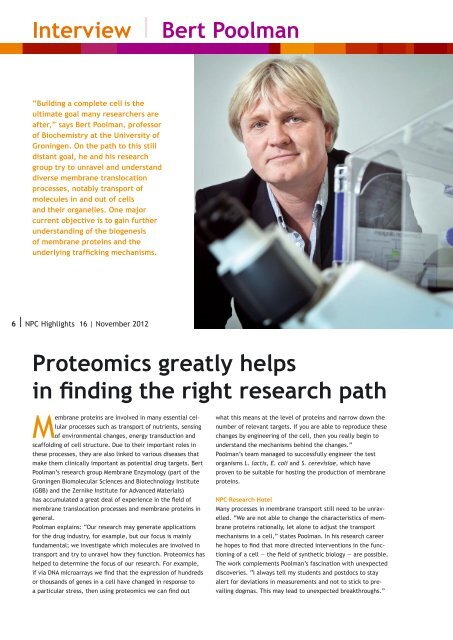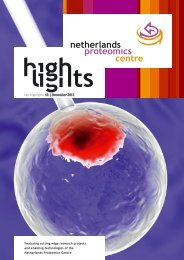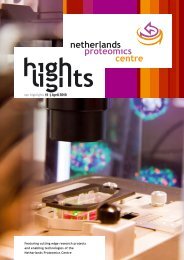Interview|Bert Poolman“Building a complete cell is theultimate goal many researchers areafter,” says Bert Poolman, professorof Biochemistry at the University ofGroningen. On the path to this stilldistant goal, he and his researchgroup try to unravel and understanddiverse membrane translocationprocesses, notably transport ofmolecules in and out of cellsand their organelles. One majorcurrent objective is to gain furtherunderstanding of the biogenesisof membrane proteins and theunderlying trafficking mechanisms. | <strong>NPC</strong> Highlights 16 | November 2012<strong>Proteomics</strong> greatly helpsin finding the right research pathMembrane proteins are involved in many essential cellularprocesses such as transport of nutrients, sensingof environmental changes, energy transduction andscaffolding of cell structure. Due to their important roles inthese processes, they are also linked to various diseases thatmake them clinically important as potential drug targets. BertPoolman’s research group Membrane Enzymology (part of theGroningen Biomolecular Sciences and Biotechnology Institute(GBB) and the Zernike Institute for Advanced Materials)has accumulated a great deal of experience in the field ofmembrane translocation processes and membrane proteins ingeneral.Poolman explains: “Our research may generate applicationsfor the drug industry, for example, but our focus is mainlyfundamental; we investigate which molecules are involved intransport and try to unravel how they function. <strong>Proteomics</strong> hashelped to determine the focus of our research. For example,if via DNA microarrays we find that the expression of hundredsor thousands of genes in a cell have changed in response toa particular stress, then using proteomics we can find outwhat this means at the level of proteins and narrow down thenumber of relevant targets. If you are able to reproduce thesechanges by engineering of the cell, then you really begin tounderstand the mechanisms behind the changes.”Poolman’s team managed to successfully engineer the testorganisms L. lactis, E. coli and S. cerevisiae, which haveproven to be suitable for hosting the production of membraneproteins.<strong>NPC</strong> Research HotelMany processes in membrane transport still need to be unravelled.“We are not able to change the characteristics of membraneproteins rationally, let alone to adjust the transportmechanisms in a cell,” states Poolman. In his research careerhe hopes to find that more directed interventions in the functioningof a cell — the field of synthetic biology — are possible.The work complements Poolman’s fascination with unexpecteddiscoveries. “I always tell my students and postdocs to stayalert for deviations in measurements and not to stick to prevailingdogmas. This may lead to unexpected breakthroughs.”
“I always tell my students not to stickto prevailing dogmas. This may lead tounexpected breakthroughs.”CareerMany research groups have collaborated or are still collaboratingwith the Poolman group because of its expertise in membranebiology. Being an <strong>NPC</strong> Research Hotel generated a greatdeal of collaboration as well. <strong>NPC</strong> guest researchers can haveproteins from highly complex mixtures analysed by mass-spectrometry-basedidentification, or individual membrane proteins,protein complexes and their modifications can also becharacterised biophysically using varying techniques. “Sincemembrane transport occurs in diverse cellular processes, wehave dealt with various topics outside of our own researchfocus as well.”Super-resolution optical microscopyTo study the dynamics and localisation of processes in cells,Poolman’s group uses super-resolution microscopy and otheroptical methods, developed with Professor Antoine van Oijen’sMolecular Biophysics group at Groningen. “Using standard opticalmicroscopy techniques, particles smaller than 200-300 nmcannot be discerned. However, with super-resolution one candiscern particles down to 10-20 nm, which is in the size rangeof proteins,” explains Poolman. “Thanks to this technique wewere able to discover that membrane proteins (coloured witha fluorescence label) are not homogeneously divided over themembrane but reside in clusters. The clustering of proteinsmay cause different properties. So far, we have been studyingensembles of cells, but our goal is to determine the proteomeof a single cell. Using this process one can really determinethe differences between individual cells.”Recent measurements indicate that seemingly homogeneousbacterial populations are in fact heterogeneous. “We wantto know why they are heterogeneous and what causes thisheterogeneity. Stochastic processes may play a role; sometimescertain proteins just happen to be present in a lowerconcentration in one cell than in the other. But occasionallythere’s a more sophisticated reason behind it. For example,if some cells are more resistant to high saline conditions thanothers, their osmoregulatory transporters may be different.If post-translational modifications are involved or moleculesare embedded in different lipid environments, two proteinsidentical in amino acid sequence may each have a differentactivity. High-resolution optical microscopy on the one handand high-resolution mass spectrometry on the other will bekey to elucidating such differences.”Continuation requiredTo perform all this research and help other researchers withtheir membrane protein questions, the Poolman group usesexpensive equipment worth more than 1 million euros. “Tostay up-to-date in our field, we occasionally need to purchasenew equipment, which obviously also costs a lot. Furthermore,to hold on to good proteomics experts we need to offer themBert Poolman2008 Program Director <strong>Centre</strong> for Synthetic Biology2003 Visiting professor at the California Instituteof Technology, Pasadena, U.S.A.1999 Professor of biochemistry, University ofGroningen1990 Research fellow at the Royal <strong>Netherlands</strong>Academy of Arts and Sciences (KNAW)1987 PhD degree (cum laude), University ofGroningenAwards2011 Elected as Faculty 1000 member2010 NWO Top-GO subsidy on membrane proteinbiogenesis2009 Elected as member of the Royal <strong>Netherlands</strong>Academy of Arts and Sciences (KNAW)2008 NGI grant renewal (<strong>NPC</strong>II) for the Membrane<strong>Proteomics</strong> <strong>Centre</strong>2007 NWO Top subsidy to support the research onABC transporters and cell volume regulationRecent key publications• Erkens, G.B. et al. (2011) The structural basis ofmodularity in ECF-type ABC transporters. NatureStruct. Mol. Biol., 18, 755-760.• Karasawa, A. et al. (2011) Cystathionine b-synthetase(CBS) domains 1 and 2 fulfill differentroles in ionic strength sensing of the ATP-bindingcassette (ABC) transporter OpuA. J. Biol. Chem.,286, 37280-37291.• Mika, J.T., and Poolman, B. (2011)Macromolecule diffusion and confinement in prokaryoticcells. Curr. Opin. Biotech., 22, 117-126.• Marreddy, R.K., et al. (2010) Amino acid accumulationlimits the overexpression of proteins inLactococcus lactis. PloS One, 5, e10317.steady jobs. Otherwise they very quickly start looking fornew jobs. The <strong>NPC</strong> has helped us enormously in providingthe means for this and structuring proteomics research inthe <strong>Netherlands</strong>. However, after 2013 when funding by theMinistry of Economics for NGI and consequently for <strong>NPC</strong> isdiscontinued, financial support will be needed to continueresearch at a high level.” Poolman has good hopes that a newinitiative like the Dutch Techcentre for Life Sciences (DTL)will be able to provide these means and secure the frontlineposition of Dutch R&D. Poolman hopes that the name <strong>NPC</strong> cansomehow be maintained, “This has really become a wellknownbrand name.”|






